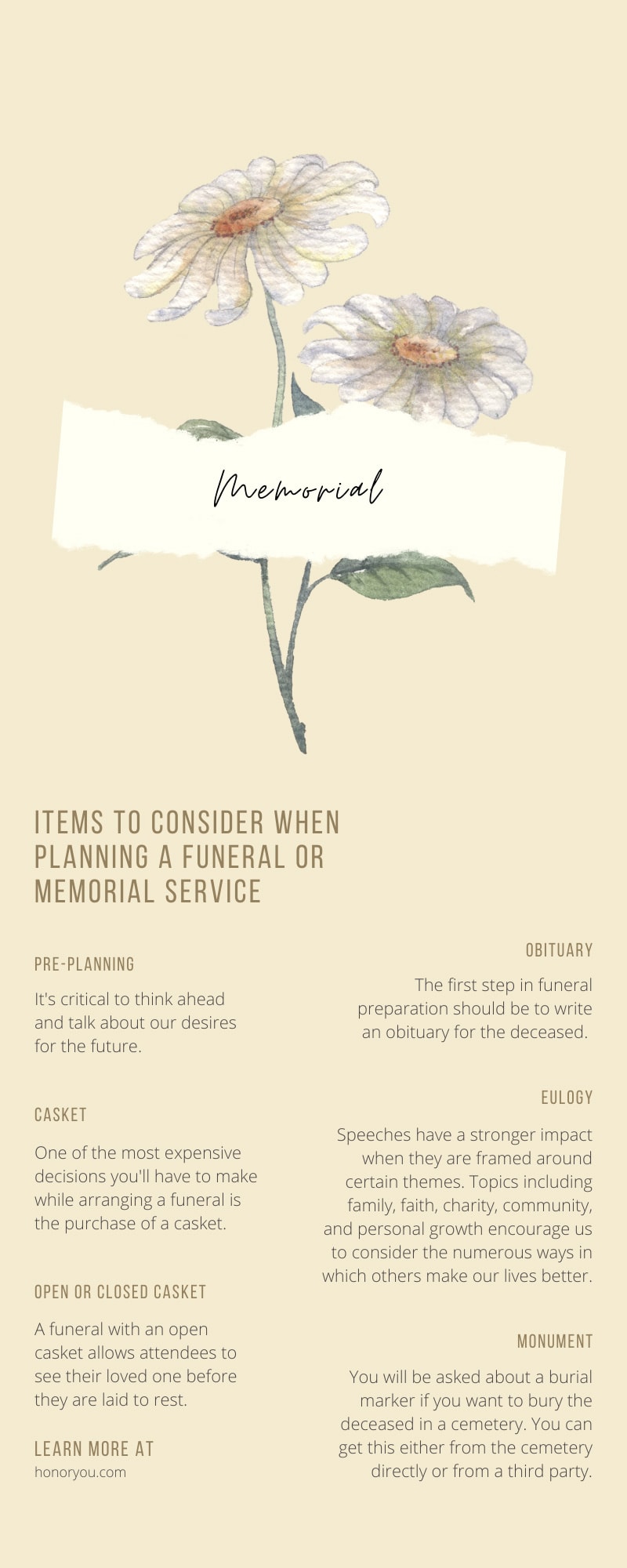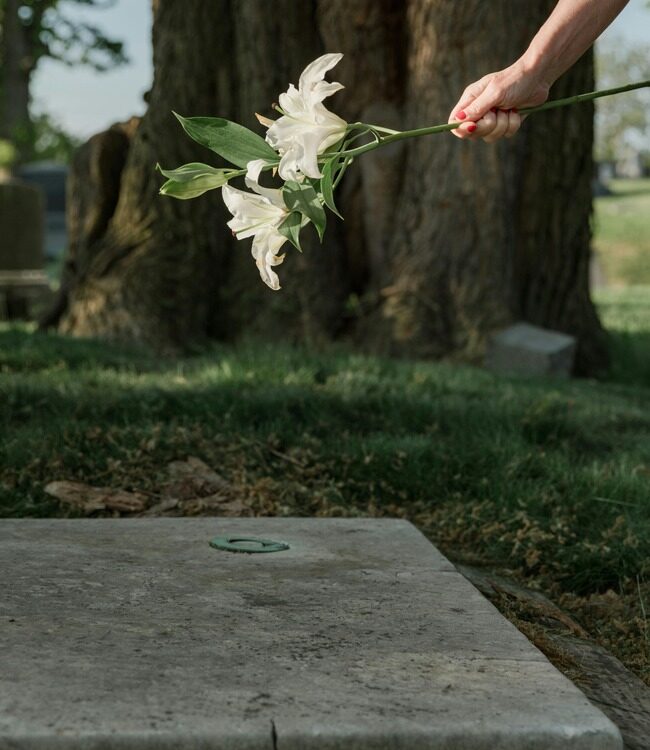Items To Consider When Planning a Funeral or Memorial Service

Your Complete Guide To Cremation Urns and Name Plates
October 8, 2021
4 Ways Different Cultures Honor & Mourn the Deceased
October 19, 2021Putting together a memorial service for a loved one who has passed can be one of the most difficult things for a person to do. During an extremely vulnerable and challenging time, it is now on you to put together a huge event that captures the spirit and legacy of this person you just lost. If you are struggling with this, take a look at these items to consider when planning a funeral or memorial service.
Pre-Planning
Nothing in our lives is certain, not even when we will die. Death can come at any time, either unexpectedly or over time. If you’re reading this, chances are that it may be too late for pre-planning, but keep this in mind for yourself. Whatever the case may be, it’s critical to think ahead and talk about our desires for the future. As a result, many families shy away from discussing death, leaving them unprepared and unsure of how to arrange a ceremony that respects their loved one’s theological, cultural, and aesthetic preferences.
This causes a great deal of worry and anxiety for the family members left behind. There is no need to be concerned about this if you make a funeral planning agenda in advance. As they say their final goodbyes, it allows families to commemorate their loved one’s legacy, achievements, and memories in the way they see fit.
Obituary
The first step in funeral preparation should be to write an obituary for the deceased. There’s more to an obituary than a death announcement. It’s a way to pay tribute to their life, work, and legacy. When writing an obituary, the following things should be included:
- Date of death. Be sure to list the date your loved one passed away as well as their age. You may include their date of birth if you wish.
- Legacy. Include some details that very quickly describe who they were. This can be along the lines of, “John Doe, painter, brother, husband, and friend, passed away…”
- Biography. If they have any major milestones in their life, such as a marriage, children, education, military service, or career accomplishments, be sure to list them, as they also give a sense to the kind of person they were.
- Hobbies. Tell people about what they liked to spend their time doing. Whether it’s photography, poetry, or going to baseball games, this is another wonderful way to celebrate their life and tell their story.
- Surviving family. Be sure to include all immediate family, such as spouse, children, siblings, and parents. If they have significant relationships with extended family, you can also write that in.
- Funeral announcement. Because you don’t always know everyone in your loved ones’ lives, it’s likely that there will be people who won’t find out where services are being held. Make sure the obituary has the specifics of where and when to be for the funeral. This allows those who can’t make it to send cards and flowers as well.
Obituaries are often published in both print and online editions of a newspaper. Make every effort to ensure that as many people as possible get the opportunity to view it. Be succinct while also being clear. In most cases, papers bill by the row or for the number of words you use. Finally, ask a friend to proofread your work for spelling and grammar mistakes before you publish it. Your writing will be more focused if you have an objective viewpoint.
Casket
One of the most expensive decisions you’ll have to make while arranging a funeral is the purchase of a casket. Costs can exceed ten thousand dollars, and salespeople may prey on people’s vulnerable emotions to get them to spend more money. You should bring a companion with you for support and guidance in these instances. Set a budget for your trip before you leave. Also, don’t be afraid to express concerns to the salesman. They are aware of the gravity of the situation. Additionally, don’t be afraid to take a break if you get too stressed out during the procedure. Everyone can relate to what you’re experiencing. Take a walk outside and you’ll be in a better position to decide after a few minutes of clearing your mind.
Eulogy
If you’re called to speak, give yourself plenty of time to prepare. Consider the times you shared with the departed. Do you have a favorite memory involving them? Something special that happened? Was there something unique about them? Make a list with as many as you can remember. After that, do a final assessment. What’s your favorite out of the bunch? Or is there a common thread that unites them? Speeches have a stronger impact when they are framed around certain themes. Topics including family, faith, charity, community, and personal growth encourage us to consider the numerous ways in which others make our lives better.
Also, don’t be afraid to use a little comedy now and again. When we share a humorous tale or a quirky fact about ourselves with our loved ones, we get a better feel of who they really are. This may be the most important item to consider when planning a funeral or memorial service.
Open or Closed Casket
A funeral with an open casket allows attendees to see their loved one before they are laid to rest. One of the first steps in the mourning process is to recognize the reality of mortality. Seen calmly in death, their loved one’s picture comforts the living. An open casket, on the other hand, may not be suitable in all situations. It’s possible that religious stigmas prohibit it. An open casket may also be distressing if the deceased person was maimed due to their disease or accident that caused their death. A last consideration is that the body may be unfit for viewing if a long period of time has elapsed in between passing and the funeral.
Monument
You will be asked about a burial marker if you want to bury the deceased in a cemetery. You can get this either from the cemetery directly or from a third party. The size, style, and kind of gravestones allowed in each cemetery are all governed by the rules specific to that cemetery. Monuments range in price from $1,000 to $3,000, based on the scale, design, and materials used. The inscription is charged separately. Name and dates of birth and death are all required for a simple biography inscribed on a headstone. An epitaph is a common addition in many families. There are many different types of messages that may be used in this section. The stone can also be engraved with the image of your loved one, but clearly the more intricate the inscription, the more expensive it will be.
Once the services have happened, you’ll want to thank your guests for coming by sending out funeral acknowledgment cards.



